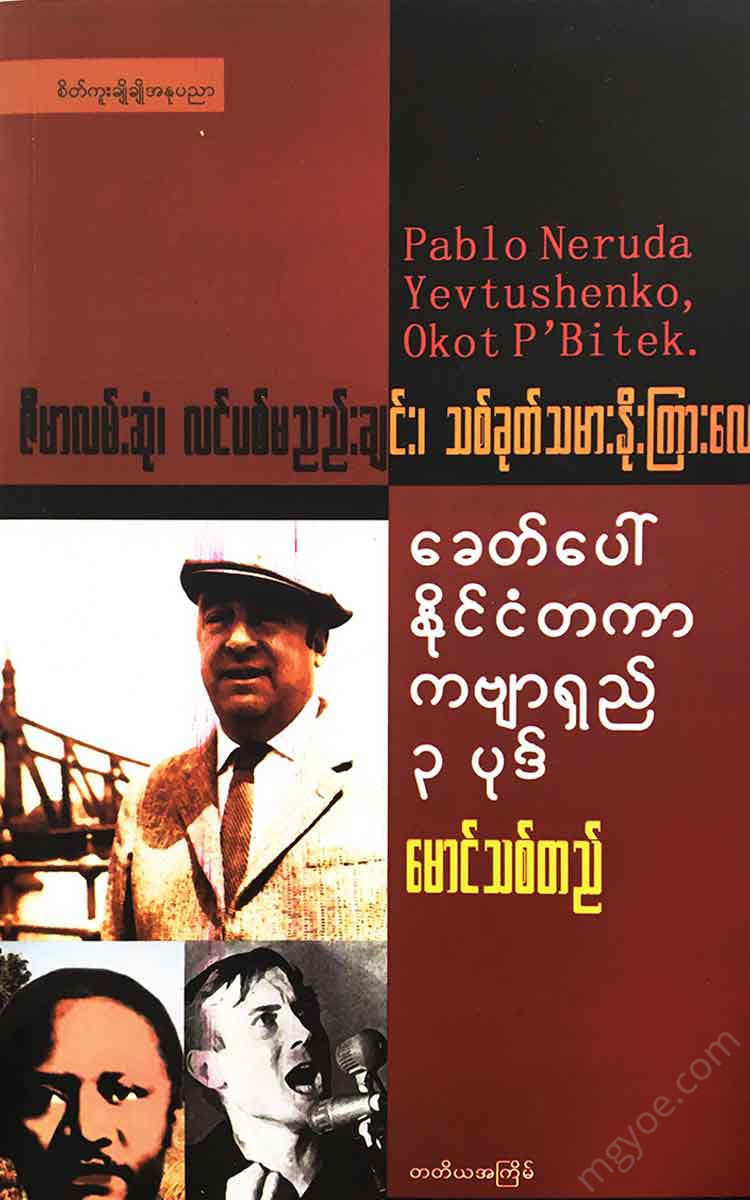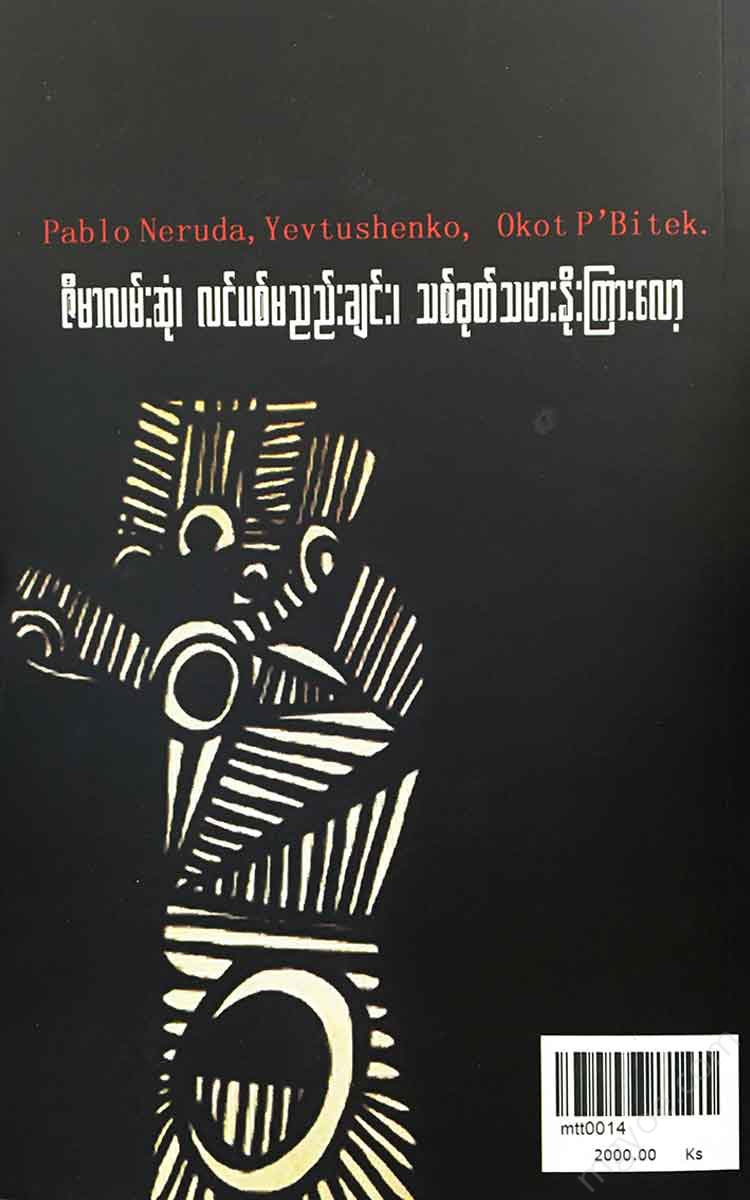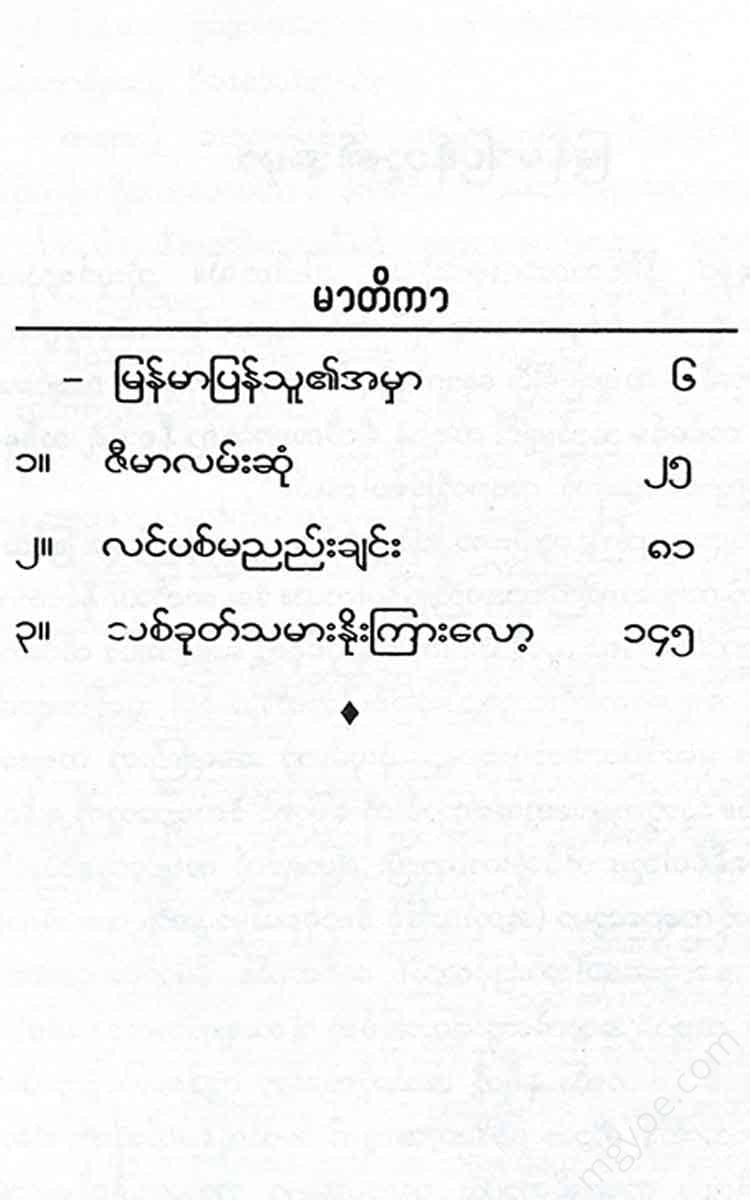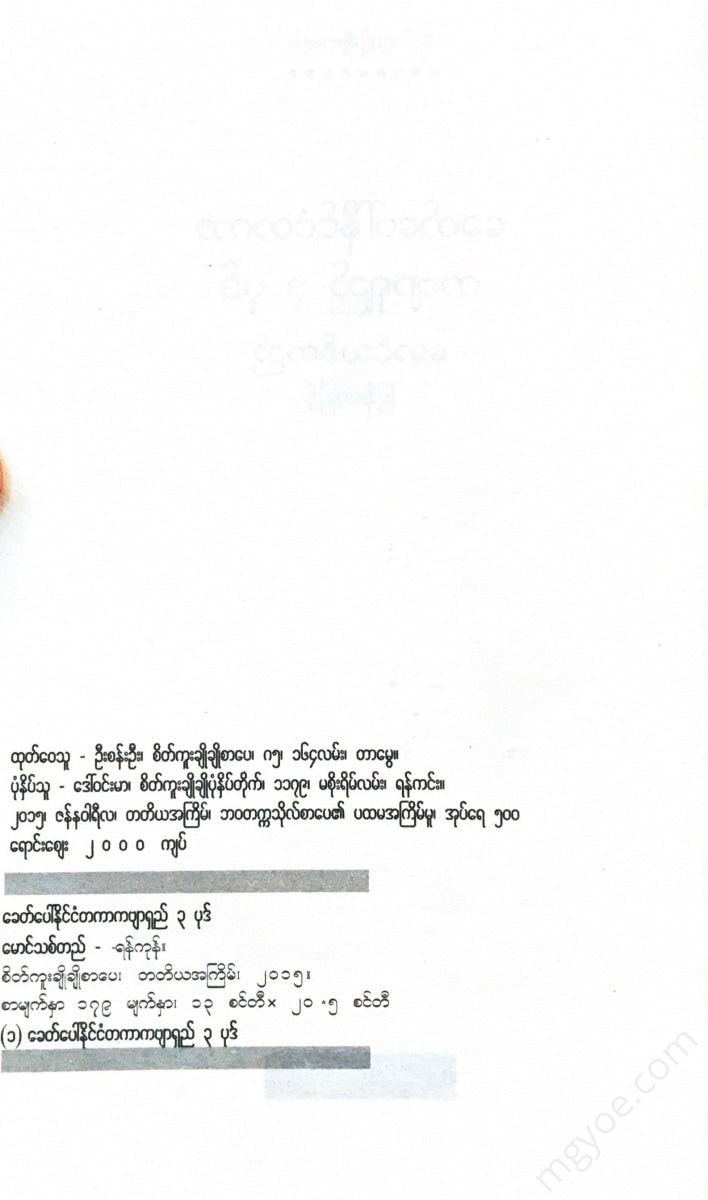စိတ်ကူးချိုချိုစာပေ
Maung Thit Tsing - 3 modern international long poems
Maung Thit Tsing - 3 modern international long poems
Couldn't load pickup availability
A message from a Myanmar returnee
This collection of poems includes three international poems. All three are long poems. One is the poem "Zima Crossroads" by the Soviet poet Yevgeny Tushenko, the other two are the poem "Limpita Lament" by the African poet Bates, and the poem "Awaken the Woodcutter" by the Chilean poet Neruda.
These three poets are both prominent and important poets. If we talk about international poetry today, we cannot leave them out, and they are the ones who must be put at the top. Among their poems, the three long poems mentioned here are also important poems. If we talk about their poems, we cannot leave them out, and they are the ones who must be put at the top.
Their poems (especially the poems mentioned in this small collection) are also new in terms of ideas. The metaphors are also new. The feeling that is the lifeblood of poetry is also a contemporary feeling. As for the voice and lyrics, we can only read them in English, so we cannot say what they are like. Poetry is not something that can be translated. Even prose such as novels and the like cannot be translated to the original. Poetry is even more subtle. You only need to know the meaning. The original words are beautiful, but when you look at them in your own words, they are not beautiful. The sound of the original words is not beautiful, and they are not meant to be simple, but when you translate them in your own language, they sound beautiful.
If we keep saying that poetry cannot be translated, we will just not translate it. I think that is a bit of a superstition. If we keep saying that Russian poetry cannot be translated, we will have to learn Russian, Italian poetry cannot be learned in Italian, and French poetry cannot be learned in French. Since poetry is translated into another language, the original meaning and sound will no longer be preserved. No matter how close the language is, if poetry is translated into another language, the meaning and sound will remain.
How can we translate the four great verses of the great master Thakin Hmong into English so that they are all in tune, rhyme, and sound? For example, how can we translate the last verse of the great four great verses of the great master Thakin Hmong, “In the quiet of sleep, when the master wrote the poem Nivindhabhavana” so that they are all in tune, rhyme, and meaning?
How can we translate the poem “He is also a worldly person, so he will be proud” from Zawgyi’s Pi Tauk Pan poem in a complete way? Don’t say the phrase “He is also a worldly person, so he will be proud.” Even the meaning should be taken back. The phrase “He is also a worldly person” contains all the sounds of compassion, lamentation, forgiveness despite guilt, and sympathy. How can we translate this meaning? Well... there must be exceptions. For example, in Min Thuwan’s Pyinma Ngoto, the line “Phu Tit Ruk Tu, Ngay Ling Ta Ya” is translated by Professor Lus. Min Thuwan expressed the feeling of the vulture and the river’s death with the sounds of “Phu Tit Ruk Tu”, which are not pleasant and pleasant. Lus also expressed this with the sounds of “Phu Tit Ruk Tu”. Even so, I only got about the meaning. His voice is different from mine. The beauty of the voice is different. As far as I've seen, this is the only song I like. Please forgive me if I'm wrong.
Robert Frost once said, “Poetry, when translated, is lost both as a lyric and as a prose.” It is true. No matter how diligent a translator is, when a poem is translated, it is no longer the original poem. It is a translation of the original. Poetry is not composed of thoughts. It is composed of words. Poetry is a tonal art, and no one can ever surpass the original in translating poetry.
So, if they can't translate poetry because they're not good enough, they'll just not translate it.
But today, there are so many translations of poetry appearing in the world of literature. People who only know one language are only reading translated poetry.
In my experience, even reading the original poem is not the same as listening to it recited. Listening to it recited -- it's very enjoyable to listen to, even if you don't understand some parts.
Once, the English poet Dylan Thomas was recorded reciting a poem by a friend of his. He recited it in English. But he was Welsh, so he couldn't understand some of the words because his voice was slurred. But it was still good to listen to.
Once upon a time, the Russian poet Yevtushkin came to Yangon and we went to listen to him recite a poem. He recited a poem in Russian called “The City of No and the City of Yes.” Although I didn’t understand Russian, I found it very enjoyable to listen to him recite. We had hoped to have a conversation with him about poetry. But we didn’t have time to say anything good. We asked questions because we didn’t have time to talk and we didn’t have time to talk.
He knew me as the translator of his Zima Junction, so he had to say a few words. But he didn't ask me what I wanted to ask. What poems are you writing now? I'll just say what poems you've published this year. Yevtushenko is an important poet not only in his country but also in the world, so he could talk a lot about his literary experience, his poetic experience. But he didn't have time to talk.
Anyway, listening to him recite poetry was a new experience for me.
Yevtushenko, the poet who wrote "Zima Junction ", was a Russian poet. Scholars say that there were two great periods of flowering in Russian poetry. One was the period between 1810 and 1840. The most prominent Russian poets during this period were Pushkin and Lermontov. The second was the period between 1900 and 1930. This period was a period when Russia went through both the tsarist and socialist systems. On the one hand, the ideas and concepts of the old system still existed, and on the other hand, the ideas of the new socialist system began to flourish. Therefore, this period should be said to be an important period in Soviet literature. Many new ideas and genres emerged in the world of literature and poetry, and various literary ideologies emerged.
In particular, various groups emerged in the world of poetry. Symbolism, futurism, constructivism, and metaphor. The writers and poets who emerged in that era were poets who continued to write both before and after the revolution. Poets such as Blok, Vryusov, Pasternak, Mayakovsky, Akhmatova, Mendelssohn, Bagrationi, and Yesenin were poets who were part of both eras. They all wrote poetry in accordance with the demands of the Soviet modern era. In other words, they composed contemporary feelings of the Soviet modern era.
Together, they should be called the poets who inaugurated the first new era of Soviet poetry.
The second period of Soviet poetry was not as turbulent as the first. By 1934, all but Akhmatova, Mendelssohn, and Pasteur had died. Even these three had ceased to write significant original poetry, and had become more limited to translations. During this period, which lasted for about thirty years, Soviet poetry did not develop as much as prose. But poetry did not die. In the 1930s and 1940s, notable poets emerged. Zabolotsky,
Vardovsky, Margarita, and Allegri were prominent poets. After this, Soviet poetry faded again due to Stalin's severe repression.
As Stalin's death approached, important poets began to emerge. Among them was Yevgeny Tushin, who wrote Zima Crossroads.
Yevtushenko was born in 1933. When he was born, the revolution in Russia had already ended. The civil war had already ended. Lenin was no longer there. Therefore, the world that Yevtushenko saw was no longer a world of conflict between the new and the old, between tsarism and socialism, between landlords and serfs; the world that Yevtushenko saw was a strong socialism. Yevtushenko was no longer a poet of the old generation, but a poet of the new generation. Therefore, he did not have the inner conflict that the conflict between the new and the old reflected. But just as the new generation looks at the old customs and truths that had been accepted before with new eyes and new perspectives, Yevtushenko also looked at the socialism that had emerged before him with the new perspectives of his generation. It is here that we can say that Yevtushenko’s new poetry was born.
Whenever asked about his biography, Yevtushenko often refers back to his poems. Yes. If you read his poetry, you can learn about his childhood. Yevtushenko was born in the small town of Zima on the Trans-Siberian Railway, a town of Ukrainian, Russian, and Tatar blood. His family was a peasant family. The poem Zima Crossroads is based on the events he saw when he returned to his hometown at the age of twenty. His father was a geologist. Life







